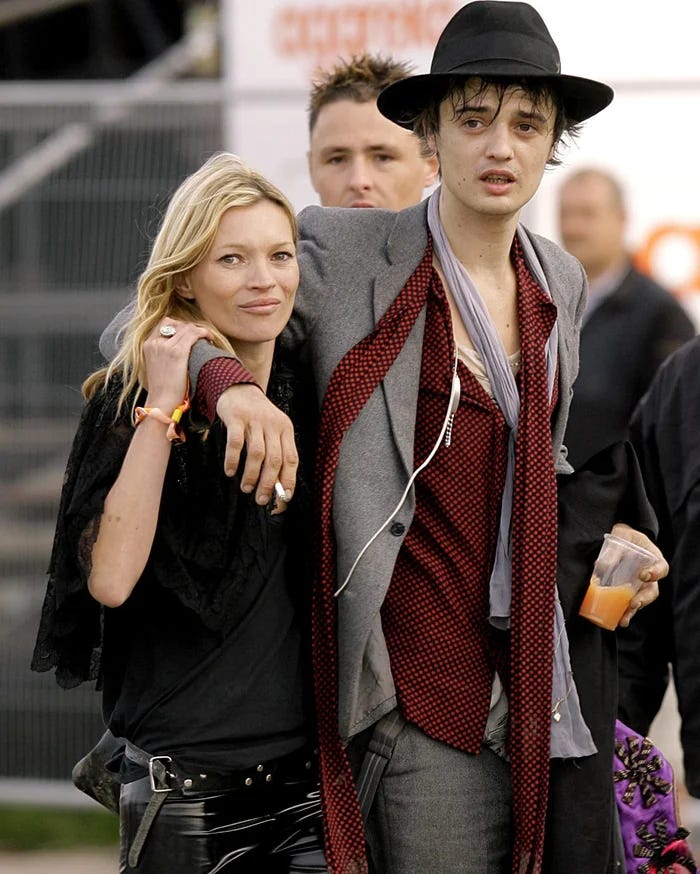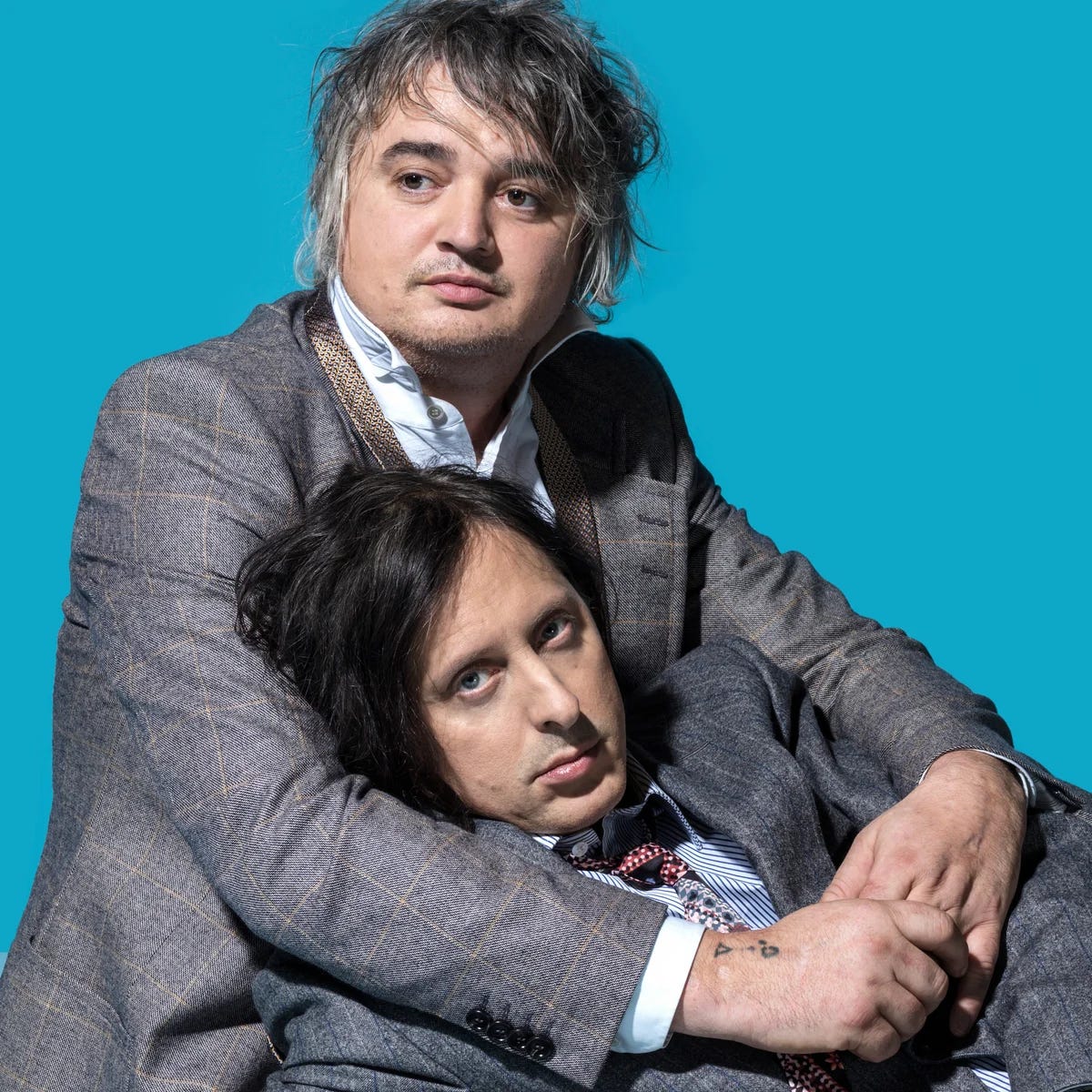pete(r) doherty and why being a genius isn't enough
a little more of my own intellectual journey
I reserve the word “genius” for very few people. For me, it basically means someone who can consistently get to a place intellectually that I can’t. Like, I can’t even imagine how you’d come up with such an amazing thing. Not only am I in awe of the outcome, but I don’t see a path to myself ever producing such an outcome.
In this sense, I would call the English musician Pete(r) Doherty a genius. Here’s a teenage (?) Doherty doing a man-on-the-street interview waiting in line for an Oasis album around the turn of the millennium.
He’s asked what he thinks about Oasis and says: “I subscribe to the Umberto Eco view that Noel Gallagher is a poet and Liam Gallagher is a town crier and I see that as a perfect combination.” The presenter is floored, asks him to repeat it for the camera, and then says “Can you sum up Oasis in one word?” Doherty says “Trousers,” takes a bite of food, and smiles. Just like—there is really stuff going on in this guy’s head and he’s magnetic.
When I was a teenager and looking for something that New Jersey suburbia and all-boys Catholic high school didn’t provide, I came across Doherty as a member of the Libertines. I fell in love with the band. The music was messy and blues-infused unlike a lot of pop music, it had real tension and grit and antsiness but dipped into dreamlike airiness. And somebody was writing incredible lyrics—stuff I listened to and dreamed about being able to write. I couldn’t fathom doing it in a million years. I still can’t.
Of course, the Libertines have two co-frontmen—Carl Bârat and Doherty. But what really shone about the band to a teenage me was Doherty’s bars. (I later realized that Bârat was the musical anchor, and Doherty’s music without him really suffers for it.)
But when the Libertines were a thing and I was 15, I couldn’t imagine a better song or better writing than Time For Heroes. Libertines songs even had callouts to classic literature (“Bill Bones knows what I mean”) that linked them to an entire ocean of culture—it made me want to read books. Like, huge books. And I did!
But just to focus on Doherty’s writing for a moment, I mean
Did you see the stylish kids in the riot? /
Shoveled up like muck, set the night on fire
or
There are fewer more distressing sights than that /
of an English man in a baseball cap
It’s all very British, very clever, very catchy, and impressive for a twenty-two year old—or anybody for that matter.
Indulge me in one more, from the same album
I saw two shadow men on the valence road
Said they'd pay me for your address
Oh, I was so boldI said you see these two cold fingers
These crooked fingers I show
You's a way to mean noWell they didn't like that much I can tell you
They said “Sunshine, I wouldn't wanna be in your shoes”
They chased me up two flights of stairs
Caught me in the lift how I sighed and said
“Hello,” cause you're impossible
It’s just like you’re ripped into this guy’s world, and the language is abstract in its precision. Why are two guys chasing him? And then there’s a little twist at the end.
be like pete?
I spent the final chunk of my teenage years wanting to be able to write like Doherty. I would say in a sense he is the most important reason I love books, literature, learning. I studied English in undergrad in big part because I developed a love of literature and also I realized that lit was a way to write like Doherty. I tried to. I wasn’t very good at it.
It’s not an understatement to say that a big part of who I am today—romantic in the 19th century sense, a huge fan of culture+history, a lover of strange worlds and spooky things—is because of Doherty and the Libertines. And I’m eternally grateful to the band for that.
About the time I was deeply infused in Libertines fandom—to the point that I was going to record stores and picking up the import singles and then transcribing them myself on my guitar—the Libertines released their second album and broke up. This was the beginning of a decade of Doherty dating Kate Moss, doing a lot of heroin, going to jail, and forming his own band Babyshambles.
It was weird—I tried really hard to stick to my Pete fandom, but it was just too much. I wasn’t attracted to drugs and jail and being compulsively self-destructive. I was attracted to the literature and good songs and wistfulness and glass of wine by the fire with an old book. I wanted a culture guru not a drug guru. I drifted away as the music became inconsistent—this is when I realized how important Bârat was, he is really the musical anchor of the Libertines and Doherty doesn’t have that on his own.
But to be honest I’ve never really fallen for another band like I did for the Libertines. I can still listen to Libertines demos that are Pete, Carl, and two guitars and be like—yep, this is the peak of music in terms of depth of feeling.
So, if you had to ask me the best band of all time, yeah I’d probably say the Libertines—two albums and all. Best lyricst? Pete Doherty. Best rock guitarist? Carl Bârat. Not even close.
reflecting today
As I’ve gotten older, I still see Pete as a true genius. Much like an older Bob Dylan talked about his young self as this being basically given magical music powers by God that he doesn’t have anymore, Pete had a few years of that level of output, roughly 2001-2005. If you don’t believe me I’d suggest you just listen to Up the Bracket start to finish with a good pair of headphones.
Let me talk about how I view human cultural output for a moment. I basically think there’s a pantheon. And everything in the pantheon is equally good. So there’s Homer. The Odyssey is in the pantheon of human cultural production. Contemporary stuff isn’t “better” than Homer. Very little makes it into the pantheon—and I think the Libertines’ first two albums are in there. The kind of stuff that when you zoom out in a thousand years you’ll be able to listen to and be like: “how the hell did someone come up with that, that’s amazing?” (This isn’t a zero sum pantheon by the way, it gets added to over time.)
But when I think about Pete today, I’m filled with deep sadness. He basically spent a decade in a heroin spiral—lighting his twenties on fire and living out his own self-destructive fantasy. Within a five-year span he went from the bright guy in the first video above to going to jail for a mixture of burglary and heroin. His love of literature lead him to late 19th century decadent novels like À Rebours and Jean Genet’s Our Lady of the Flowers. And instead of viewing these novels as windows into a foreign world, he decided they were guideposts on how to live. So he mixed ostentatiousness with tawdriness (and a lot of drugs) and lost a decade.
Part of me wonders if Doherty was sort of like, doing a bit as a messed up rockstar trying to find salvation or something. “I was a troubled teen,” he writes in this song—but was he? Who knows. It’s hard to figure out from listening to him. I guess self-destructiveness and self-understanding don’t exactly go hand in hand.
In 2016, the Libertines reformed and put out a pretty good album. They put out another pretty good album last year. Both much better than I expected. But without the giddy-up of Up the Bracket or the tension of The Libertines, they aren’t in the pantheon for me.
Today, Pete—now Peter—I think is doing good. He’s playing music, he’s clean, I follow him on Instagram. It all feels very normal and tangible, given that it started off in a mythical parallel universe Britain called Albion. A little too normal, and that makes me sad. The rockstar who swore he’d find salvation in supermodels, drugs, and 19th century French poetry… is eating clean and taking ice baths for his health. I guess there’s a deep lesson in that.
it’s not about pathos or logos it’s about ethos
The big thing for me here is—having the ability isn’t enough. You need other things to go with it. Young Pete needed better support and better guidance in his life to develop self-understanding and self-compassion and treat himself (and the people around him) better. He needed a love-of-self that would have told him that emulating the worst habits of Belle Époque aristocrats was not going to get him to where he wanted to be. He needed perspective that producing art while immolating yourself may be romantic, but it is not wise.
To his great credit, I think he figured some of this stuff out. And I love that he’s still making music—I listen to literally every release of his and Carl’s.
But there are also so many lessons in his story about how being a human is about more than the ability to do stuff or to feel certain feelings. It’s about all of these other squishy and hard to articulate things like showing yourself respect, choosing your friends wisely, and learning to resolve conflicts.
Anyway, I’m happy Peter is in the world, it’s brighter with him (and Carl).


